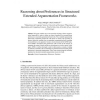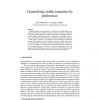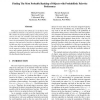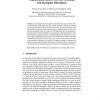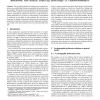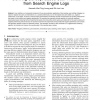174
click to vote
AAMAS
2011
Springer
14 years 8 months ago
2011
Springer
We study the case where agents have preferences over ranges (intervals) of values, and we wish to elicit and aggregate these preferences. For example, consider a set of climatologi...
137
click to vote
COMMA
2010
14 years 9 months ago
2010
Abstract. This paper combines two recent extensions of Dung's abstract argumenrameworks in order to define an abstract formalism for reasoning about preferences in structured ...
161
click to vote
COMMA
2010
14 years 9 months ago
2010
Different proposals have been made in the literature for refining Dung's argumentation framework by preferences between arguments. The idea is to ignore an attack if the atta...
145
click to vote
CVPR
2011
IEEE
14 years 9 months ago
2011
IEEE
While most existing enhancement tools for photographs have universal auto-enhancement functionality, recent research [8] shows that users can have personalized preferences. In thi...
122
click to vote
ICDAR
2009
IEEE
14 years 11 months ago
2009
IEEE
This paper discusses the ranking of a set of objects when a possibly inconsistent set of pairwise preferences is given. We consider the task of ranking objects when pairwise prefe...
134
click to vote
CLIMA
2009
14 years 12 months ago
2009
Abstract. No intelligent decision support system functions even remotely without knowing the preferences of the user. A major problem is that the way average users think about and ...
133
click to vote
EMNLP
2010
15 years 1 days ago
2010
The task of selecting information and rendering it appropriately appears in multiple contexts in summarization. In this paper we present a model that simultaneously optimizes sele...
122
click to vote
ECAI
2010
Springer
15 years 1 days ago
2010
Springer
Abstract. We consider the problem of learning a user's ordinal preferences on a multiattribute domain, assuming that her preferences are lexicographic. We introduce a general ...
122
click to vote
TKDE
2010
15 years 12 days ago
2010
—User profiling is a fundamental component of any personalization applications. Most existing user profiling strategies are based on objects that users are interested in (i.e., p...
131
click to vote
JUCS
2010
15 years 14 days ago
2010
Abstract: This paper addresses the problem of expressing preferences among nonfunctional properties of services in a Web service architecture. In such a context, semantic and non-f...

